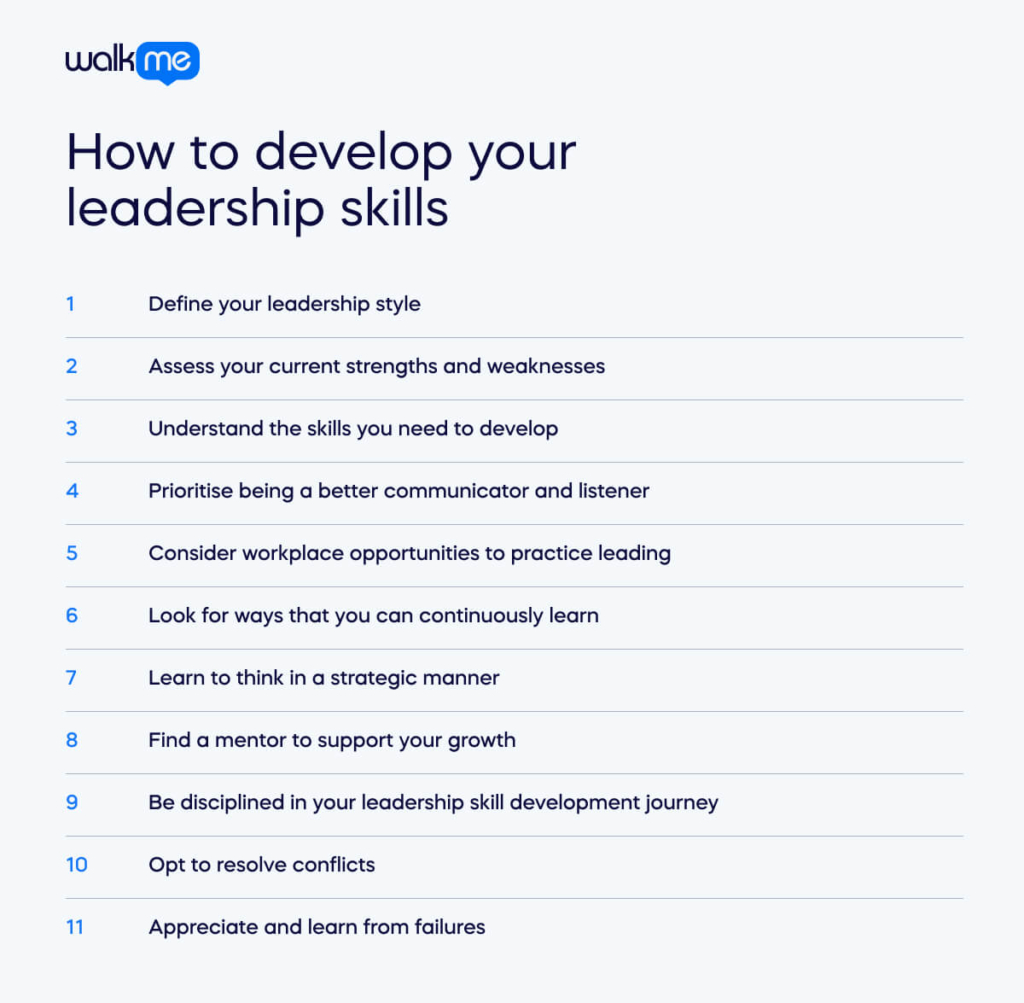Leadership skills are crucial for success in business and any career. These skills help you inspire, motivate, and guide others. Successful leadership is essential, whether at work or in your community.
Good leaders are resilient. They make smart decisions and take responsibility for their actions. They also use many skills, such as delegating tasks and communicating clearly. Effective leadership creates a positive digital workplace and improves company results.
Improving leadership skills benefits not just your career but also your personal relationships. Better communication and emotional intelligence enhance both work and personal life.
As you develop these skills, you will grow personally. This process helps you use your natural talents to inspire others. It also increases your self-awareness. Improved self-awareness allows you to manage your emotions, stay focused, and achieve more. This article will guide you through steps to develop your leadership skills.

1. Define your leadership style
Knowing your leadership style helps you build managerial skills that suit you best. Are you a democratic, visionary, coaching, affiliative, pacesetting, or commanding leader? Identifying your style will help you focus on improving your strengths and addressing weaknesses.
Each style has its pros and cons. For example, democratic leaders might struggle in crises. Visionary leaders might find planning challenging. Instead of accepting these traits as unchangeable, work on them.
Authoritarian leaders often make quick decisions. However, they may need to improve their listening skills. Delegative leaders who give their teams a lot of freedom may need to work on decision-making and building relationships.
Coach-style leaders focus on individual growth. They need to be strong communicators and relationship builders. If you lean towards strategic leadership, practice your big-picture thinking.
2. Assess your current strengths and weaknesses
Recognizing your strengths and weaknesses can be tough. We often miss our blind spots. But, it’s important to understand these to reach your full potential.
Start by listing your strengths and weaknesses in detail. Be specific. Ask others for feedback to get a clearer picture. It’s hard to be objective about yourself.
Keeping a journal of your successes and failures can help. Review it regularly. This will help you better understand yourself and how to use your talents effectively.
Think about any leadership roles you’ve had, even small ones. Leadership skills are similar across different situations. Reflect on what worked and what didn’t. For instance, you might not have resolved as many conflicts as you wanted to. Use these insights to improve in future roles.
3. Understand the skills you need to develop
After identifying your strengths and weaknesses, focus on specific leadership skills you want to improve.
Create a plan that outlines the steps you need to take, the resources you will use, and the milestones you aim to reach. Regularly check your progress and adjust your plan as needed. Set specific, measurable, achievable, relevant, and time-bound goals.
Think about what you want to achieve in the short and long term. This will help you consistently improve your leadership skills and track your progress.
Consider developing skills like creativity, critical thinking, decision-making, motivation, negotiation, and relationship building. For example, if your manager chose another to lead a project rather than you due to their innovative ideas, you might want to brush up on your creativity.
4. Prioritise being a better communicator and listener
Good leaders are skilled in both communication and listening. To improve, practice these skills often.
Effective communication starts with active listening. This means understanding not just the words but also their meaning. Pay attention to body language. Repeat what the other person says to confirm understanding. Ask questions to show interest. Stay fully engaged in the conversation.
Use these techniques in every conversation. You could practice active listening when networking internally or externally. Listening to what the other person says will also help you network better.
After practicing active listening, focus on other communication skills—confidently express your needs and desires. Pay attention to both your words and body language. Also, improve your writing skills. Mastering these areas will help you lead more effectively.
5. Consider workplace opportunities to practice leading
Good leaders spot opportunities and act on them to benefit the company and its employees. Be proactive, and don’t wait for things to happen. Anticipate challenges and prepare your team for any issues that may arise. When an employee brings a problem to you, work with them to find the cause. Then, measures should be put in place to prevent similar issues in the future.
To stand out, volunteer for extra responsibilities and learn skills beyond your current role. Don’t become complacent. Challenge yourself by stepping out of your comfort zone and taking on new tasks. The more work you do and the more you learn, the better prepared you will be for a leadership role.
As you take initiative and keep learning, others will see you as a leader. Stay connected with your team. Listen to their concerns, check in regularly, and encourage their involvement to keep them motivated and engaged.
6. Look for ways that you can continuously learn
Knowledge is crucial for effective leadership. To grow as a leader, you need to keep learning. Leadership training programs and seminars can help with this. Interactive e-learning is also a great way to gain new skills. They also offer opportunities to connect with other professionals.
Choose reputable and accredited programs. Remember, learning doesn’t come only from courses. Stay aware of your surroundings and gain real-life leadership experience. Learning from experienced leaders on the job can also provide valuable insights.
Participating in extracurricular activities can also help you grow outside of work. Take on leadership roles in clubs, non-profits, or sports. This could include being a committee member of a governing body or a captain of your local basketball team. These opportunities allow you to practice your skills while doing something you enjoy.
7. Learn to think in a strategic manner
When you’re focused on daily tasks, stepping back and seeing the bigger picture can be challenging. However, this skill is crucial for any leader.
To start improving your strategic thinking, ask big-picture questions in meetings. Even if they’re not directly related to your role, asking why certain decisions were made and how they fit into the overall strategy can be helpful.
Expand your network beyond your immediate team. Have lunch with colleagues from sales or services. This will help you understand other parts of the organization and its challenges.
Organize your time effectively. While daily tasks are important, set aside time for larger projects and personal development.
Be prepared to speak up. Share your ideas and opinions in meetings. Show that you’re open to new ideas and willing to think creatively about strategies.
8. Find a mentor to support your growth
A great leadership mentor helps you develop the skills needed for leadership roles. This relationship benefits both the mentor and the mentee. It offers a valuable chance to grow.
You can find mentors through formal programs or informally. Choose someone with experience and respect in leadership. They should be honest and provide helpful feedback.
Your mentor might be a professor, a boss who challenges you, or a local business owner you know. It’s important to feel comfortable with your mentor. You need to build a trusting relationship.
Once you find the right mentor, meet regularly. Be ready to listen and learn. Every time you meet, show how you have implemented the advice they gave you the last time.
9. Be disciplined in your leadership skill development journey
To be an effective leader, you need to be disciplined. You also need to ensure your team is disciplined. Discipline is essential in both your work and personal life. It helps you lead well and encourages others to follow your example.
Show discipline by meeting deadlines, keeping appointments, and ending meetings on time. If you struggle with organization, start with small personal changes. For example, try waking up early and exercising daily. Build on these habits on a gradual basis.
When facing a tough project, don’t give up at the first sign of trouble. Look for solutions and maintain a positive outlook on your work. This will also encourage your team to work with you and be the best they can be.
10. Opt to resolve conflicts
Improve your leadership skills by managing conflicts effectively. This doesn’t mean seeking out conflicts or stepping into issues that your boss should handle. Focus on smaller disputes between individuals or groups that might go unnoticed. These situations offer good chances to practice resolving disagreements.
Handling conflicts helps you learn to balance different viewpoints and offer solutions. It also gives a fresh perspective to those involved. Conflicts often arise in teams due to differing beliefs and communication styles. Instead of seeing these as problems, view them as opportunities to develop conflict resolution skills.
Work on mediating disputes, using emotional intelligence, and respecting different opinions. Gaining experience in these areas will prepare you for future challenges, improve collaboration, and strengthen team relationships.
11. Appreciate and learn from failures
Success often comes from learning through failure. Each mistake or setback helps you move closer to your goals. Embrace this idea as part of learning how to handle failure effectively.
View failure as a chance to grow, not as an end. Reflect on what went wrong and why. Use these insights to improve your approach. Remember, failure does not define your worth. It is an opportunity to learn and get better.
Be open to feedback and take responsibility for your actions. Avoid excuses and blame. Instead, assess yourself honestly and seek different viewpoints to better understand yourself.
See failure as a way to spark creativity and try new things. Treat setbacks as chances to explore new ideas. Encourage risk-taking and experimentation in your team. Celebrate both successes and failures. Each helps you grow and innovate.
Grow into a leadership role by continually developing your leadership skills
Developing leadership skills is crucial for career growth and personal development. Good leaders gain recognition, access to higher positions, and the ability to inspire others. Leadership skills are also useful in many areas of life. They improve effectiveness at work and home.
Great leaders aren’t born; they build their skills over time through experience and learning. Key skills include effective communication, discipline, conflict resolution, and taking on extra responsibilities.
A successful leader must also be a good follower. They should be open to new ideas and respectful of others’ views.
To improve your leadership, continue learning and supporting your team. Listen actively and encourage teamwork to create a positive work environment. Stay positive and make clear decisions.
Effective leadership boosts organizational performance. It makes the workplace more efficient and satisfying for employees. Remember, becoming a great leader takes time. Ask for honest feedback from your team and work on your weaknesses.

FAQs
Key differences exist between leadership and management skills. Leadership focuses on inspiring and motivating others to achieve a common goal by setting a vision and guiding people toward it. Management is about planning, organizing, and coordinating resources to meet goals.
You can improve your leadership skills through mentorship opportunities, continuous learning, and finding your leadership style. You can also improve by setting goals for achieving and improving leadership skills.
The most important leadership skills are:
- Active listening
- Strategic thinking
- Flexibility
- Creativity
- Time management
- Communication
- Conflict resolution
Leadership skills development can improve an organization by helping to manage change, handle resistance, and get stakeholder buy-in.
You can grow your leadership skills every day by having a plan to achieve it. You can have a timeline by which you want to achieve a goal and also need to know which leadership skills you want to focus on.

